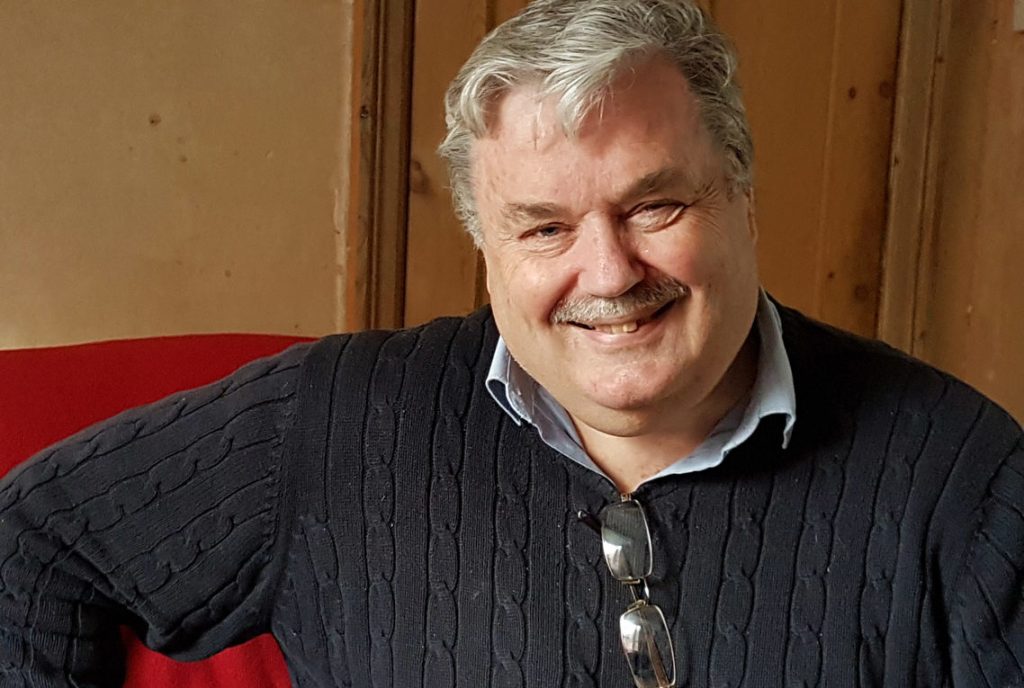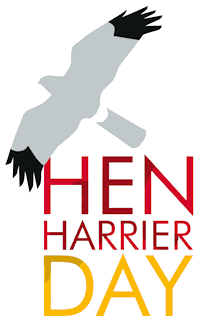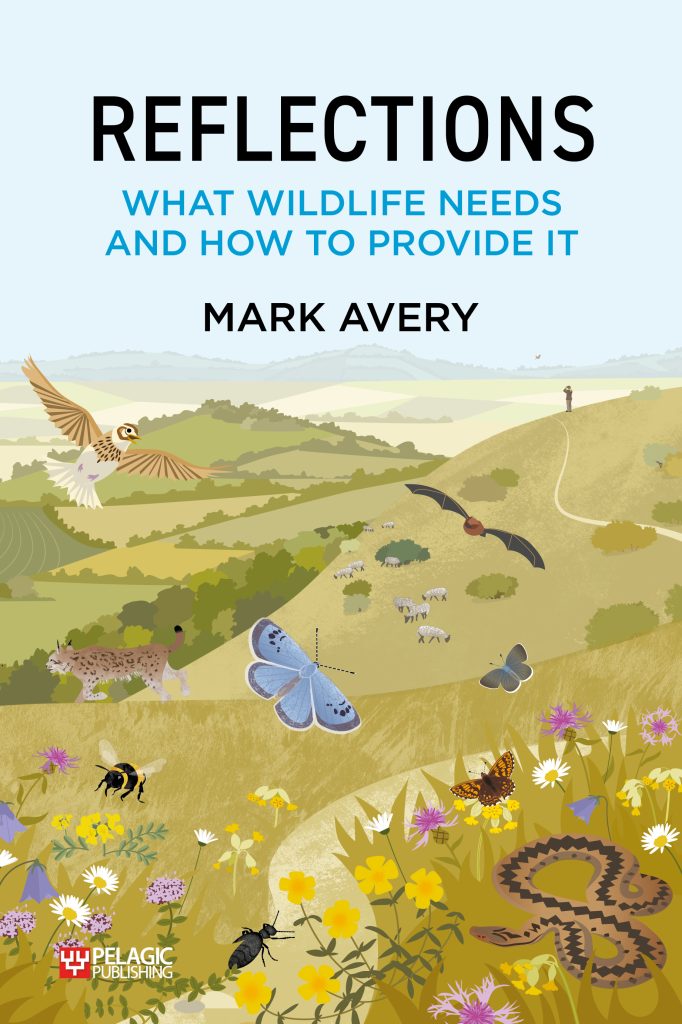
The new book from Mark Avery – lifelong conservationist, author and campaigning founder of Wild Justice along with Chris Packham and Ruth Tingay – offers a informed overview of the state of nature in the UK and delivers a radical set of ideas on how to effect change in wildlife conservation.
Published in July 2023 by Pelagic Publishing, Reflections: What Wildlife Needs and How to Provide It has been widely praised by conservationists and environmental campaigners for its knowledgeable and personal insights into wildlife conservation successes and failures, what we can learn from them, and how to deliver a better future for UK wildlife.
Each chapter concludes with some personal reflections from a lifetime’s work in nature conservation, and the final chapter sets out seven practical ‘proposals’ showing how we can all act individually and together to make a big difference for UK wildlife.
Earlier this month we interviewed Mark to find out more about his new book and the inspiration behind it, and to discover what he is working on now in his writing and campaigning.
HHA: Your new book – Reflections – has variously been described as ‘a love letter to nature’ and ‘a strikingly radical set of proposals for how to turn around the decline of wildlife in these isles’. What prompted you to write this now?
I started thinking about the book some time ago. I was looking back at Fighting for Birds, which I wrote over 10 years ago, and felt it needed an update. Along the way, it turned into writing a new book!
I was really pleased by some of the comments I got when the book was published. I can see why Tim Smit described it as ‘a love letter to nature’, because much of the book is very personal – the wildlife in my house, garden, street and very close by. But if we do love nature, and it is declining, we must be doing something wrong.
I’ve been involved in wildlife conservation for a very long time, I’ve seen a lot of what goes on, and I think about it often. I knew that I had some good ideas on how we could ‘turn around the decline of wildlife’ and I wanted the book to get these across as accessibly as possible.
HHA: Whose attention are you most hoping to capture with Reflections?
It would be lovely if every politician in the country read it! But I doubt whether many – if any – will. I would love it if all the senior conservationists and council members in the big NGOs read it and talk about it, and I think that many of them will.
But in the end, to get more nature, we need to influence politicians. And the big NGOs have the clout to exert that influence. And we’re all paying for those conservation organisations through our memberships and donations, so we have a collective clout!
But we tend to do this at arm’s length. We pay our money and then forget about it. We think ‘I’ve done my bit’. I hope that all of us can become a bit more active – ‘active investors’ is how I’ve described it in the book.
Nature conservation should be a social joint enterprise, and the more of us that get involved, the better. We all have some power and influence.
HHA: There’s plenty of scientific evidence in the book, but you have been careful to ‘personalise’ it and make it accessible through the Reflections at the end of each chapter. Was this in your mind at the outset, and are you pleased with how it has worked out?
I had the structure mostly sorted out in my head before I started the book. My writing is very direct – I like to write in a conversational style. I hope that makes it easier for the reader. I like explaining things, and I’ve always been good at it.
I am quite pleased with it, but it’s up to the readership in the end of the day.
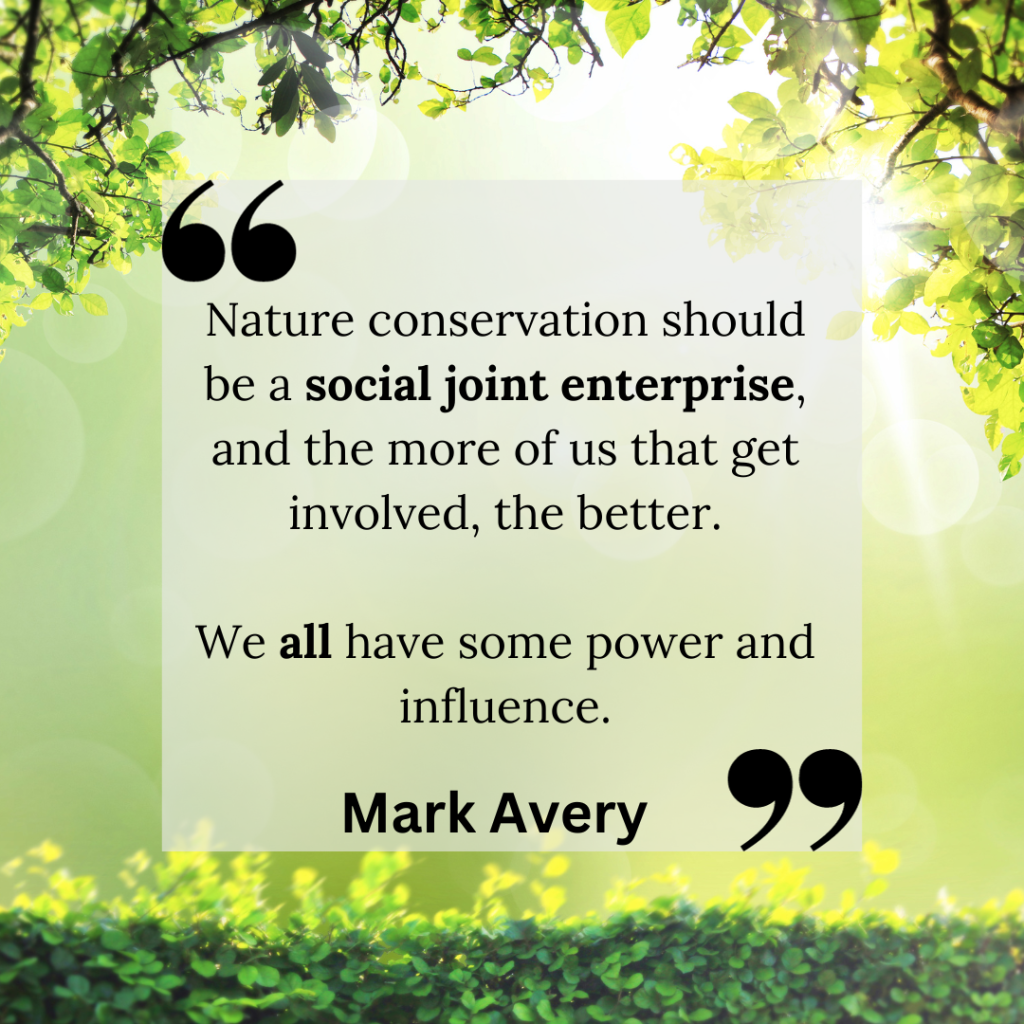
HHA: Inevitably when discussing our collective failure to protect wildlife, politics features prominently. How optimistic do you feel about the importance attached to wildlife and conservation by the UK governments and political parties?
That’s a big question! Contrary to popular belief, politics is not a dirty word. Politics is about looking at the world as you would like it to be, and making difficult choices, depending on whether you want better schools, more hospitals, richer wildlife. So how much nature we have around us is a highly political issue.
I feel depressed, living in England under a Conservative government. Despite wanting to be the ‘greenest government ever’ at one stage, things have got worse. There’s been more progress in Scotland and Wales than there has been in England. In Scotland, licensing of grouse shooting and muirburn is coming in, and they are both important initiatives to solve some wildlife problems, particularly for Hen Harriers. And there have been some strong statements from Scottish politicians, about raptor persecution, for example, which simply haven’t happened south of the border.
All that we have had so far in England are some rather limp restrictions on burning – they’re not bad, but they’re not as strong as they should be, given that the Climate Change Committee said last year, and the year before, that burning should stop now.
With an election coming up next year, we all need to be leaning on political parties to put pledges in their manifestoes, because it is much more difficult to wriggle out of an election promise if it’s enshrined in the manifesto. And more difficult for the House of Lords to delay a commitment from an elected government.
Labour has said it will commit to grouse moor licensing, and we need to make sure that happens. But I’d be quite prepared to give them that chance. Labour is an enigma, because they are an urban party, and few Labour MPs would recognise a Red Grouse, a Curlew, or a Hen Harrier if you took them out into the uplands. But they are consultative, and they will seek the views of NGOs like the RSPB, the Wildlife Trusts, the Woodland Trust, and the National Trust, and they are less likely to listen to the views of organisations like the Moorland Association, who they will see as just another vested interest.
HHA: The ‘Four Horsemen of the Ecological Apocalypse’ is a brilliant analogy – Invasives, Overharvesting, Pollution and Habitat Loss. How did you come up with this, and were there other ‘horsemen’ you considered?
I’m glad you liked it, but it is not entirely my own conception. Both in the UK and globally, providing that you accept that climate change is an element of Pollution, then they are the Big Four, the Evil Quartet. Two American writers – Edward O Wilson and Jared Diamond – both used variations on the analogy.
Seven Proposals for Delivering What Wildlife Needs
HHA: The book concludes with 7 ‘Proposals’ for delivering what wildlife needs. Some are proposals that readers could campaign for, and some are more personal. Do you hope that motivated readers will be spurred to action on all your proposals? Or just one or two?
The last three proposals are the most personal ones. For example, how you choose where to invest your money – subscriptions, donations – with NGOs. You can just do that. If you think about it, this thing called ‘membership’ – it costs quite a lot of money. Yes, you get something back from it. Maybe a magazine, access to nature reserves.
And most people think that membership is their contribution to wildlife conservation. But it’s an investment. You’ve got choices. Do I invest in WWF or the Woodland Trust? The RSPB or Plantlife? If you were investing to get a good pension, you’d do a lot of research on how your money would be best invested.
And that’s exactly what I am recommending that people do to invest in a better future for wildlife. Don’t just give your money to the organisation that you’ve always been a member of, not without asking a few questions and looking at what they’re doing with it.
It makes a difference, trust me! I’ve been on the receiving end when I was at the RSPB. When you get load of letters from members asking ‘Can you tell me what you’ve done in the last year? Has my subscription been successful in saving wildlife? And what are you doing in the next year? Because I am wondering whether to continue giving you my money or putting my wildlife investment elsewhere.’
Later this year, I’ll be writing a few blog posts with letters that I’ll be sending to NGOs, and I hope that readers will be doing the same. Watch this space!
HHA: I’d like to ask you about Proposal 3: Rewild the Uplands. Your recommendation – for a modest fund targeted at the National Parks to bid for government rewilding grants – seems eminently practical. How can we make it a reality?
We need to persuade the bigger NGOs to get behind it. For example, Rewilding Britain, Big Picture Scotland, and Trees for Life are influential in this area and could play a part and bring about significant change.
Our National Parks are obviously the place to start because they are National Parks in name only. In other parts of the world, you know you’re in a National Park because you see loads of nature. You can’t tell when you’re inside or outside a National Park in the UK because it looks just the same!
Forestry Commission woodland is also a good bet because that belongs to us. There are some decisions the state could make on the balance between timber production and wildlife conservation. The more land we own through the government, the more we can influence those decisions.
We’ve given away too much of the countryside, and we need to take back control. And that needs political pressure, partly because it is a funding decision but also because it is a change, and it is always difficult to achieve change in the system.
The Forestry Commission was set up in 1919, because we needed more timber. That was a big decision. Maybe we could make a big decision about public ownership of land for wildlife. Where wildlife gets a bigger influence. And that would involve rewilding as a big part of it.
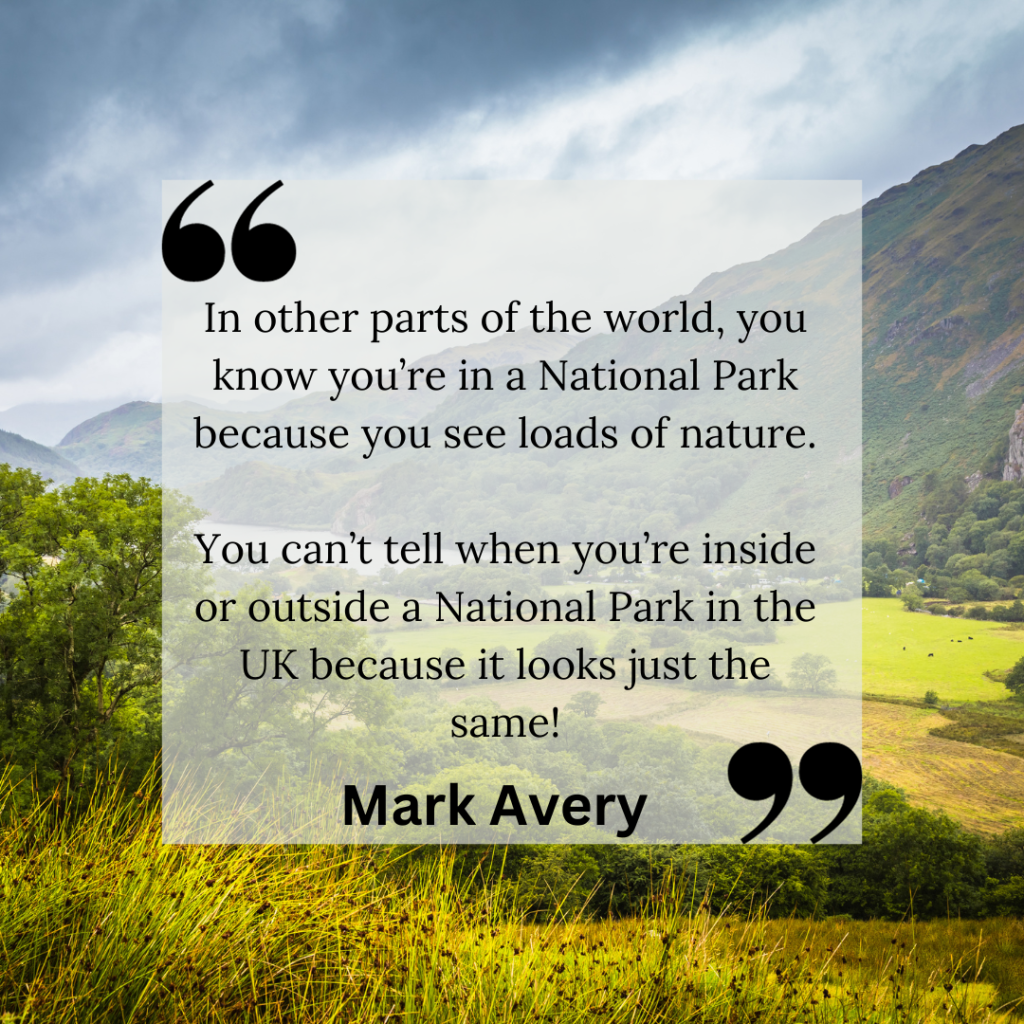
HHA: What is next for you now, Mark? What projects are you working on?
Well, I am working on some things, but I’m not going to tell you what they are! I’ve got to write a book chapter in the next few months that is relevant to what we have been talking about. I’m going to write a book next year in collaboration with someone else. I still write for British Wildlife magazine, and Wild Justice keeps me pretty busy too.
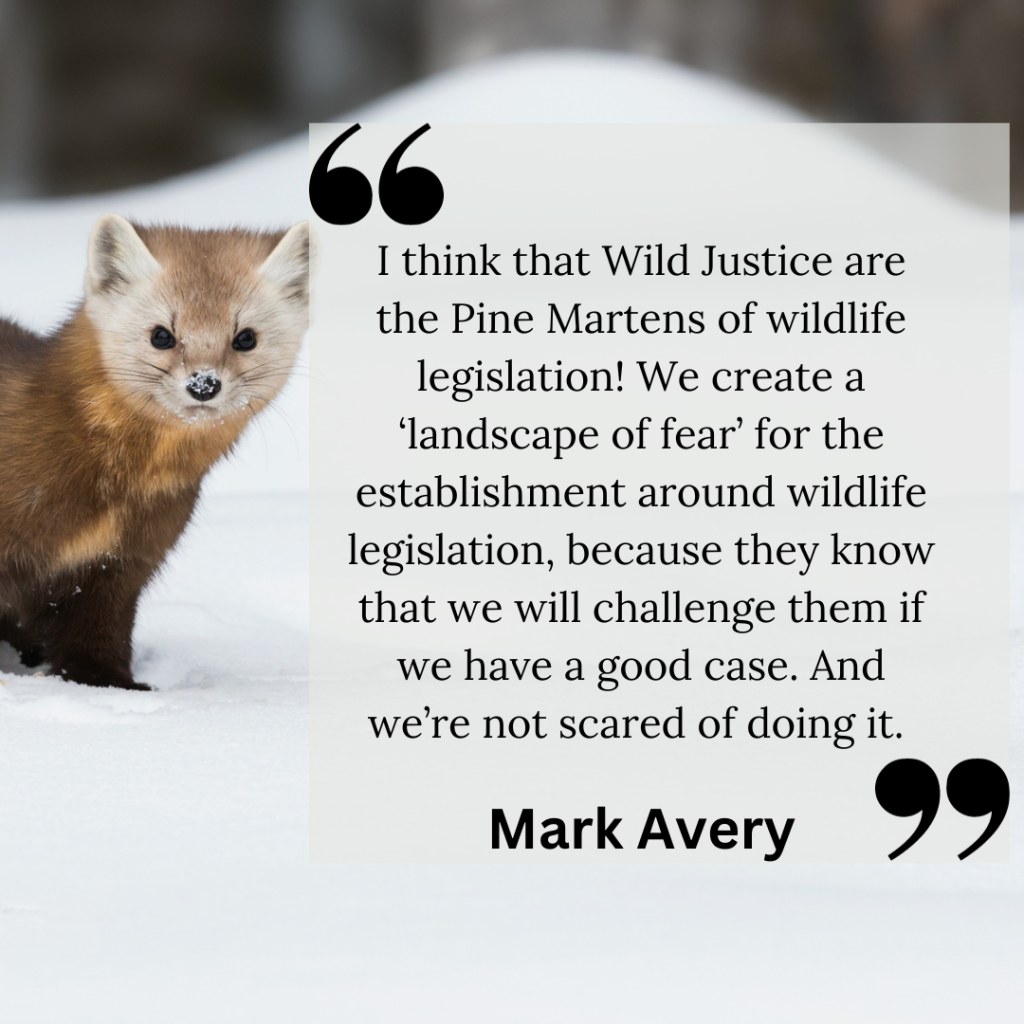
HHA: Wild Justice seems to have found a very effective formula to challenge policy and drive real change. Will you continue to fight for a better deal and stronger protection for wildlife through the courts in this way?
Yes, we will. None of the three of us likes losing, but even when you lose you win a little, and when you win, you’ve won a lot. In these legal challenges, you’re much more likely to lose than win, even though on some of the appeals we’ve lost, I’ve struggled to grasp what the judge must be thinking!
We’re busy all the time on Wild Justice work. It’s becoming more difficult to take on some of the legal cases because government and its agencies are getting smarter about the ways they can protect themselves. But that’s still a win because they know there is much more scrutiny now.
Let me give you a wildlife analogy. You’ll have read in Reflections about Pine Martens and how they predate Grey Squirrels, which allows Red Squirrels to recover. Pine Martens don’t spend all their time eating Grey Squirrels but, when they are in woods, they create ‘a landscape of fear’ for Grey Squirrels – it changes their behaviour.
Well, I think that Wild Justice are the Pine Martens of wildlife legislation! We create a ‘landscape of fear’ for the establishment around wildlife legislation, because they know that we will challenge them if we have a good case. And we’re not scared of doing it. In fact, we’re used to doing it.
We’re going to keep going, and we can only do that because so many people support us.
HHA: In 2015 in your book Inglorious, you predicted that ‘driven grouse shooting’s days are numbered … in the thousands rather than in the tens of thousands’. Do you still feel confident about this?
Yes, I do. Reflections looks at the progress we’ve made on banning driven grouse shooting. It hasn’t happened yet, but we’re moving towards licensing.
If it works, that’ll be great, but I don’t think it will work quite as well as people hope. I think banning driven grouse shooting is eventually inevitable.
With a different government we might have been further on.
Reflections: What Wildlife Needs and How to Provide It is available from Amazon, Waterstones and direct from the publishers, Pelagic Publishing.
Mark’s excellent blog – Standing Up for Nature – can be found here, where you can also subscribe to his monthly newsletter. He can also be found on X/Twitter with the handle @MarkAvery.
